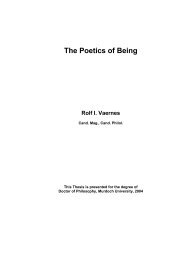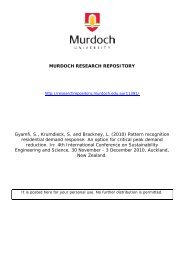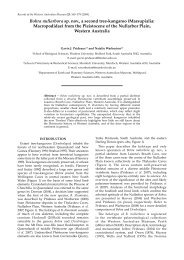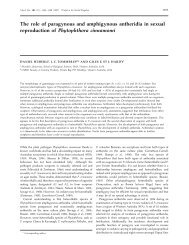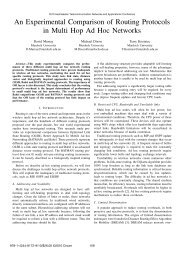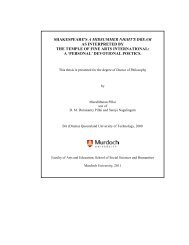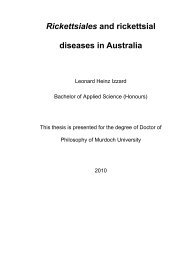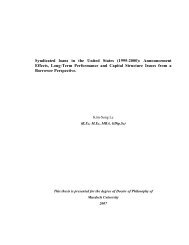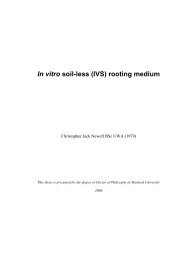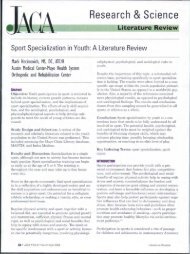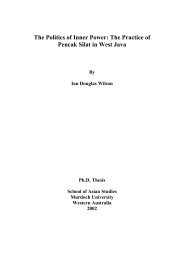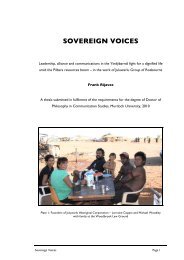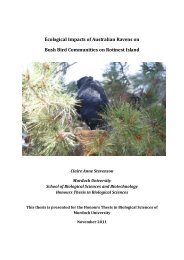National Review of School Music Education - Murdoch Research ...
National Review of School Music Education - Murdoch Research ...
National Review of School Music Education - Murdoch Research ...
You also want an ePaper? Increase the reach of your titles
YUMPU automatically turns print PDFs into web optimized ePapers that Google loves.
America take some form <strong>of</strong> music up to Year 10 and ‘probably less than half <strong>of</strong> that by Year 12’<br />
(Walker, 2005, p. 36). In Hong Kong, McPherson (2004, cited in Walker, 2005) reports less than<br />
1% for both the 16-plus and 18-plus cohorts participating in the centralised school music<br />
examinations. The issues <strong>of</strong> accessibility and participation in Australian music education have been<br />
raised by Bonham (1984). She writes:<br />
When music education is not freely available to all socio-economic groups it follows that<br />
considerable numbers <strong>of</strong> musically gifted and talented young people will remain unidentified,<br />
to become frustrated in later life when it will be too late for them to pursue a career in music.<br />
When music education can be bought in the private sector by parents who are willing to pay,<br />
the music pr<strong>of</strong>essions can only draw on this one class in the community for the next<br />
generation <strong>of</strong> members, and for moral support. The consequence is that the pursuit <strong>of</strong> fine<br />
music as a field <strong>of</strong> endeavour, is rightly open to charges <strong>of</strong> elitism because it is only available<br />
to the affluent. Elitism based on high standards must be preserved at all costs, but how can<br />
we support exclusively based on the ability to pay? (p. 103)<br />
Although a key strength <strong>of</strong> Australian music education lies in the recognition that ‘music should be<br />
available to all children throughout their schooling’ (McPherson & Dunbar-Hall, 2001, p. 23), the<br />
Stevens’ Report (MCA, 2003) found that Australian students could complete 13 years <strong>of</strong> education<br />
without participating in any form <strong>of</strong> music education. This is especially possible in Victoria,<br />
Western Australia or the Australian Capital Territory where there are no mandatory or prescribed<br />
requirements for music education. The South Australia and Queensland curricula prescribe music<br />
education only in Year 8 while New South Wales stipulates 100 hours <strong>of</strong> music study for Years 7<br />
and 8.<br />
Two recent studies in Australia have revealed widespread interest in music and arts education. The<br />
Australia Council’s national study, Australian and the Arts, found that 85% <strong>of</strong> Australians agreed that<br />
the Arts ‘should be an important <strong>of</strong> the education <strong>of</strong> every Australian kid’ and 86% would feel<br />
more positive about the Arts if there were ‘better education and opportunities for kids in the arts’<br />
(Costantoura, 2001, p. 311). The Australian Attitudes to <strong>Music</strong> survey (Australian <strong>Music</strong><br />
Association, 2001) found near unanimous concurrence that the study <strong>of</strong> music should be part <strong>of</strong> a<br />
well-rounded education (95%) and all schools should <strong>of</strong>fer an instrumental music education as part<br />
<strong>of</strong> the regular curriculum (91%). The study also found that 87% <strong>of</strong> respondents supported the<br />
notion that music education should be mandated by the States to ensure every child has an<br />
opportunity to study music in school.<br />
An important study by Lepherd (1994) reports that the economic recession <strong>of</strong> the 1980s had<br />
‘placed greater pressure on teachers to perform better with fewer resources’ (p. 5) and saw ‘the<br />
lowering <strong>of</strong> esteem for music’ (p. 13). It acknowledges the difficulty <strong>of</strong> ‘universal access to music<br />
education’ due to the problems <strong>of</strong> distance and isolation within Australia (p. 42). Respondents in<br />
the study express concern that ‘less musically qualified people were making policy decisions’ as the<br />
move towards devolution diminished the role <strong>of</strong> central administration (p. 49) and axed specialized<br />
music advisory personnel who used to provide pr<strong>of</strong>essional development and support for music<br />
teachers (p. 50). The issue <strong>of</strong> insufficient funding for music has been brought up ‘almost<br />
unanimously’ by respondents to the study who cite the need for more support for talented<br />
children, maintenance and replacement <strong>of</strong> equipment, in-service training and ‘fully qualified<br />
teachers at the primary level’ (p. 55).<br />
Two landmark studies <strong>of</strong> Australian music education undertaken by Bartle (1968) and Covell<br />
(1970) concluded that the status and conditions <strong>of</strong> music education in Australian schools were<br />
poor and recommended major changes. Both made recommendations regarding having specialist<br />
teachers in primary schools, and the undertaking <strong>of</strong> reforms to syllabus documents and teacher<br />
training. Bartle also recommended the deployment <strong>of</strong> itinerant instrumental teachers in<br />
government primary schools to lay the foundation for the subject in secondary schools.<br />
Some twenty years later, primary music teaching was still found wanting by researchers such as<br />
Gifford (1993), Russell-Bowie (1993), Jeanneret (1994), Lepherd (1994) and Stevens (2000). The<br />
major findings <strong>of</strong> these largely quantitative studies consistently revealed that music in Australian<br />
primary schools suffered a low status within the general curriculum, receiving little support or<br />
direction. The 1995 Senate Enquiry into Arts <strong>Education</strong> reinforced the earlier findings, concluding<br />
that for music to be taught effectively: (1) curriculum changes needed to be monitored; (2)<br />
pr<strong>of</strong>essional development programmes needed to improve in quality and quantity; and (3) the<br />
number <strong>of</strong> specialist or advisory (consultant) teachers available to primary schools should be<br />
increased. The Enquiry notes that ‘[g]eneralist primary classroom teachers, because <strong>of</strong> their own<br />
poor arts experience at school, and because <strong>of</strong> inadequate teacher training, lack confidence to teach<br />
the arts. As a result… there is a strong impulse to marginalise the arts in their teaching’ (p. 49).<br />
FINAL REPORT 7



